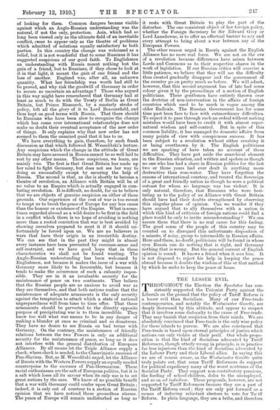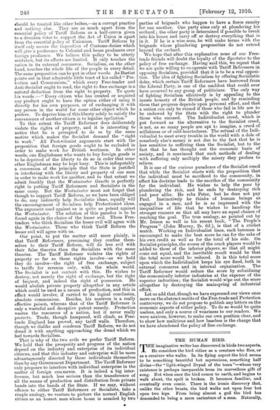THE LESSER EVIL. T HROUGHOUT the Election the Spectator has con-
sistently supported the Unionist Party against the Liberals on the ground that the policy of Tariff Reform is a lesser evil than Socialism. Many of our Free-trade contemporaries, and notably the Westminster Gazette, are deeply distressed by this attitude, and appear to suspect that it involves some disloyalty to the cause of Free-trade. They may banish that suspicion from their minds. We are absolutely convinced that Free-trade is the only wise policy for these islands to pursue. We are also convinced that Free-trade is based upon eternal principles of justice which nations can only violate at their peril. Our whole propo- sition is that the kind of Socialism advocated by Tariff Reformers, though utterly wrong in principle, is in practice far less injurious than the kind of Socialism advocated by the Labour Party and their Liberal allies. In saying this we are of course aware, as the Westminster Gazette quite truly points out, that some Tariff Reformers do support for political expediency many of the worst nostrums of the Socialist Party. They support non-contributory pensions, the feeding of school-children, doles to the unemployed, and so on ad infinitum. These proposals, however, are not supported by Tariff Reformers because they are a part of the Tariff Reform creed ; they are only put forward as a means of inducing reluctant electors to vote for Taliff Reform. In plain language, they are a bribe, and therefore should be treated like other bribes,—as a corrupt practice and nothing else. They are as much apart from the essential policy of Tariff Reform as a half-crown given to a drunken voter to support the Act of Union is apart from the essential policy of Unionism. Tariff Reform by itself only means the imposition of Customs-duties which will give a preference to Colonial and home producers over foreign producers. We believe this policy to be utterly mistaken, but its effects are limited. It only touches the nation in its external commerce. Socialism, on the other hand, touches the whole life of the people in every detail. The same proposition can be put in other words. As Bastiat points out in that admirable little tract of his called" Pro• tection and Communism," which every Free-trader and Anti-Socialist ought to read, the right to free exchange is a natural deduction from the right to property. To quote his words :—" Every citizen who has created or acquired any product ought to have the option either of using it directly for his own purposes, or of exchanging it with any person in the world for some other object which he prefers. To deprive him of this liberty solely to satisfy the convenience of another citizen is to legalise spoliation.'
To this extent the Tariff Reformer does deliberately violate the rights of property, and it is interesting to notice that he is prompted to do so by the same motive which makes the Socialist demand the " right to work." All ProtEttionist arguments start with the proposition that foreign goods ought to be excluded in order to make work for British workmen. In other words, one Englishman who wants to buy foreign goods is to be deprived of the liberty to do so in order that some other Englishman may be kept busy. This is indisputably a concession of the principle that the State is justified in interfering with the liberty and property of one man in order to make work for another, and to that extent we admit frankly that the Westminster Gazette is perfectly right in putting Tariff Reformers and Socialists in the same camp. But the Westminster must not forget that though to support Tariff Reform, as we have been obliged to do, may indirectly help Socialistic ideas, equally will the encouragement of Socialism help Protectionist ideas, The argument used against us is quite as potent against the Westminster. The solution of this paradox is bto be found again in the choice of the lesser evil. Those Free- traders who think Socialism the lesser evil will agree with the Westminster. Those who think Tariff Reform the lesser evil will agree with us.
Our point, to put the matter still more plainly, is that Tariff Reformers, presuming they confine them- selves to their Tariff Reform, will do less evil with their false theories than the Socialists with the same theories. The Tariff Reformer violates the rights of property so far as those rights involve—as we hold they do involve—the right of free exchange, subject to tariffs for revenue only, with the whole world. The Socialist is not content with this. He wishes to destroy, not merely the right of exchange, but the right of bequest, and indeed the right of possession. He would. abolish private property altogether in any article which could be used as a means of production, and this in effect would involve, if carried to its logical conclusion, absolute communism. Besides, his nostrum is a really effective poison, whereas that of the Tariff Reformer is only a wasteful and deceptive patent remedy. Protection wastes the resources of a nation, but it never really protects. Trade, though hampered, will climb, as Free- trade England has proved, any tariff walls. Therefore, though we dislike and condemn Tariff Reform, we do not dread it with anything approaching the dread which we feel towards Socialism.
That is why of the two evils we prefer Tariff Reform. We hold that the prosperity and progress of the nation depend on the industry and enterprise of its individual citizens, and that this industry and enterprise will be more advantageously directed by those individuals themselves than by any Government Department. The Tariff Reformer only proposes to interfere with individual enterprise in the matter of foreign commerce. It is indeed a big inter- ference, but much less serious than the transference of all the means of production and distribution from private hands into the hands of the State. If we may, without offence to either Tariff Reformers or Socialists, take a simple analogy, we venture to picture the normal English citizen as an honest man whose home is assailed by two parties of brigands who happen to have a fierce enmity for one another. One party aims only at plundering his orchard ; the other party is determined if possible to break into his house and carry off or destroy everything that is in it. If he is a wise man, he will make terms with the brigands whose plundering propensities do not extend. beyond the orchard. We hope that after this explanation none of our Free- trade friends will doubt the loyalty of the Spectator to the policy of free exchange. Having said this, we repeat that we are quite willing to co-operate with Tariff Reformers in opposing Socialism, provided that it is to be a real opposi- tion. The idea of fighting Socialism by offering Socialistic doles, which certain Tariff Reformers have borrowed from the Liberal Party, is one of the maddest that could ever have occurred to any group of politicians. The only way of fighting Socialism effectively is by appealing to the innate honesty of the British people, and by reminding them that progress depends upon personal effort, and that a nation can only be ruined if those who fail in life are to be endowed by the State with the right to plunder those who succeed. The Individualist creed, which is put forward as the alternative to the Socialist creed, is not, as so many people are apt t3 imagine, a creed of selfishness or of cold-heartedness. The refusal of the Indi- vidualist to meet every trouble in the world with a dole of somebody else's money is not due to the fact that he is less sensitive to suffering than the Socialist, but to the fact that he has thought out the economic basis of society, and is convinced that such methods of dealing with suffering only multiply the misery they profess to relieve.
It is one of the curious paradoxes of the Socialist creed. that while the Socialist starts with the proposition that the individual must be sacrificed to the community, in effect his doctrine leads to the sacrifice of the community for the individual. He wishes to help the poor by plundering the rich, and he ends by destroying rich and poor alike. He robs Peter, but he does not pay Paul. Instinctively he thinks of human beings as engaged in a race, and he is so impressed with the inequalities of life that he wishes to handicap the stronger runners so that all may have an equal chance of reaching the goal. The true analogy, as pointed out by Mr. Ireson so well in his recent book, " The People's Progress" (John Murray, 2s. 6d.), is that of a cricket match. Working on Individualist lines, each batsman is encouraged to make the best score he can for the sake of his own credit as well as for the total of his side. On Socialist principles, the scores of the crack players would be added to those of the inferior players, so that all might come out equal, and the inevitable result would be that the total score would b3 reduced. It is this total score upon which the Individualist keeps his eye fixed, both in external commerce and in internal organisation. The Tariff Reformer would reduce the score by subsidising the economically inferior industries at the expense of the superior industries ; the Socialist would wipe out the score altogether by destroying the mainspring of industrial effort.
Let us add that, though we have expressed our views once more on the abstract merits of the Free-trade and Protection controversy, we do not propose to publish any letters on the economic aspects of either policy. To do so would be quite useless, and only a source of weariness to our readers. We were anxious, however, to make our own position clear, and to show how malicious and how baseless is the charge that we have abandoned the policy of free exchange.











































 Previous page
Previous page